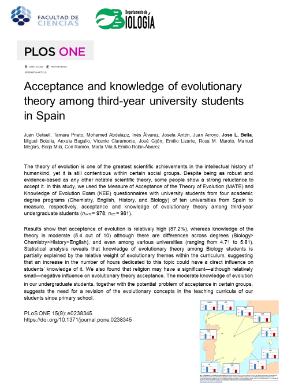
The theory of evolution is one of the greatest scientific achievements in the intellectual history of humankind, yet it is still contentious within certain social groups. Despite being as robust and evidence-based as any other notable scientific theory, some people show a strong reluctance to accept it. In this study, we used the Measure of Acceptance of the Theory of Evolution (MATE) and Knowledge of Evolution Exam (KEE) questionnaires with university students from four academic degree programs (Chemistry, English, History, and Biology) of ten universities from Spain to measure, respectively, acceptance and knowledge of evolutionary theory among third-year undergraduate students (nMATE = 978; nKEE = 981).
Results show that acceptance of evolution is relatively high (87.2%), whereas knowledge of the theory is moderate (5.4 out of 10) although there are differences across degrees (Biology> Chemistry>History>English), and even among various universities (ranging from 4.71 to 5.81). Statistical analysis reveals that knowledge of evolutionary theory among Biology students is partially explained by the relative weight of evolutionary themes within the curriculum, suggesting that an increase in the number of hours dedicated to this topic could have a direct influence on students’ knowledge of it. We also found that religion may have a significant—although relatively small—negative influence on evolutionary theory acceptance. The moderate knowledge of evolution in our undergraduate students, together with the potential problem of acceptance in certain groups, suggests the need for a revision of the evolutionary concepts in the teaching curricula of our students since primary school.
Universidad Autónoma de Madrid © 2008 · Ciudad Universitaria de Cantoblanco · 28049 Madrid · Información y Conserjería: 91 497 43 31 E-mail: informacion.ciencias@uam.es Gestión de estudiantes de Grado y Posgrado: 91 497 8264 / 4329 / 4353 / 4349 / 6879 / 8362 E-mail: administracion.ciencias@uam.es